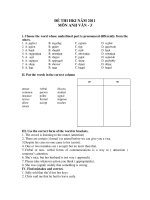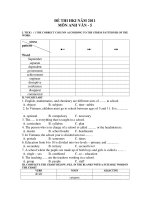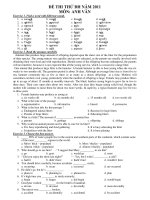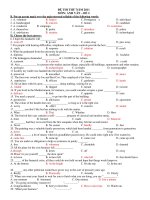ĐỀ THI HKI NĂM 2011 MÔN ANH VĂN - 4 pps
Bạn đang xem bản rút gọn của tài liệu. Xem và tải ngay bản đầy đủ của tài liệu tại đây (41.68 KB, 3 trang )
ĐỀ THI HKI NĂM 2011
MÔN ANH VĂN - 4
I. Choose the word whose underlined part is pronounced differently from the
others.
1. A. brings B. leaves C. coughs D. days
2.A. goes B. shoes C. knows D. uses
3. A. tastes B. washes C. buses D. arranges
4. A. derived B. cleaned C. cancelled D. guessed
5. A. promoted B. added C. pressed D. founded
II. Choose the word whose main stress is placed differently from the others.
1. A. social B. conduct C. survey D. value
2. A. marvelous B. attention C. consider D. excited
3. A. verbal B. whistle C. precede D. marriage
4. A. attract B. decide C. reject D. beauty
5. A. solution B. suitable C. confidence D. family
III. Vocabulary and structure
1.Don’t worry. I’ll you a hand with the washing up.
A. borrow B. give C. return D. take
2.It’s not easy to change people’s toward a certain problem.
A. attitude B. idea C. opinion D. thinking
3. Why don’t you make it bigger and more colourful in order to people/s
attention.
A. keep B. hold C. attract D. raise
4. Non – verbal such as waving, nodding or shaking of the head also have
cultural meanings.
A. signs B. signals C. hints D. marks
5. She this cool pair of blue sunglasses.
A. is just buying B. has just bought C. had just bought D. is just going to
buy.
6. Then, he something that his boss sometime before.
A. remembered/had said B. had remembered/said
C. remembered/ was saying D. was remembering / said
7. They explained that they a slight technical problem.
A. would have B. were having C. are having D. have had
8. He that she had been chosen to play in the national team.
A. said her B. told C. talked to her D. told her
9. They wanted to know in the area .
A. how long would you stay B. if you would stay how long
C. how long you would stay D. how long will you stay
10. She asked me you work on the project.
A. if you had finished B. whether you finished
C. you had finished D. if you have finished
IV. Choose the word/phrase that would not be appreciate.
1 He asked if I can make an appointment.
A B C D
2. It’s the first time I saw this film
A B C D
3. Mike told that he was leaving the next day, not then.
A B C D
4. They asked us to not talk about the matter any more.
A B C D
5. She said she works eight hours a day except Sunday.
A B C D
V. Reading comprehension:
CONVERSATIONAL TURNS
Probably the most (1 ) recognized conversational convention is that people take
(2 ) speaking. But how do they know when it is their turn? Some (3 ) must
be present, otherwise conversation would be continual breaking down into a
disorganized jumble of interruption and simultaneous talk.
Turn – taking cues are usually quite subtle. People do not simply (4 ) talking
when they are ready to yield the floor. They usually signal in advance that they are
about to conclude .The clues may be semantic ( “ so anyway, “ or “ Last but not
least, ”); but more commonly the speech itself can be modified to show that a
turn is about to (5 ) – typically, by lowering its pitch, loudness ,or speed.
Body movements and patterns of eye (6 ) are especially important. While
speaking ,we look at away from our listener in about equal (7 ) ; but as we
approach the end of a turn, we look at the listener more steadily.
Listeners are not passive in all of this. Here too there are several ways of (8 )
that someone wants to speak next. One way is though an observable increase in
body tension – by learning forward or producing an audible intake of breath. A
less subtle approach is simply to (9 ) - a strategy that may be tolerated , if the
purpose is to (10 ) what the speaker is saying , but that more usually leads to
social disapproval.
1. A. widely B. completely C. easily D. largely
2. A. sides B. care C. interest D. turns
3. A. regulation B. rules C. norms D. laws
4. A. stop B. end C. start D. give up
5. A. end B. stop C. complete D. final
6. A. movement B. contact C. look D. appearance
7. A. parts B. shares C. turns D. proportion
8. A. signing B. signaling C. hinting D. saying
9. A. break B. cut C. interrupt D. interfere
10. A. clear B. paraphrase C. repeat D. clarify
VI. Structures:
1. When did they buy this house ?
A. How long have they bought this house ? B. How long have they lived in
this house ? C. Since when did they live in this house ? D How long did
they live in this house ? 2. 2.“I have found a new flat, “ said Ann.
A. Ann said that she has found a new flat. B. Ann told that she had found a
new flat. C. Ann said me that she had found a new flat D Ann said to me that she
had found a new flat.
3. I have never played golf before.
A. This is the first time I have ever played golf. B.I used to play golf but I gave it
up already C. It’s the last time I played golf. D. It is the first
time I had played golf .
4. “ What made you change your mind ? “ John asked.
A. John asked what made me change my mind.
B. John wanted to know what had changed my mind.
C. John asked what had made me change my mind. D. B & C









